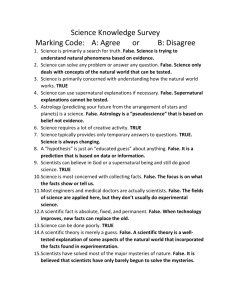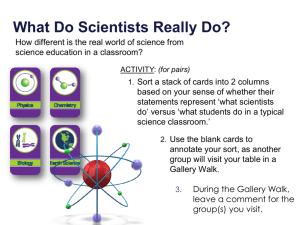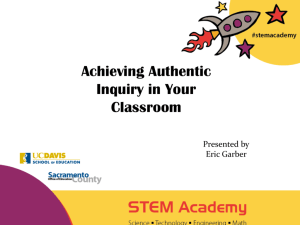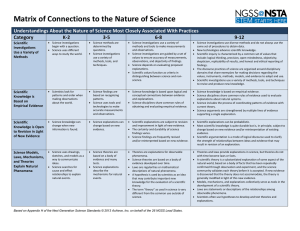Understandings About the Nature of Science: Four Crosscutting
advertisement
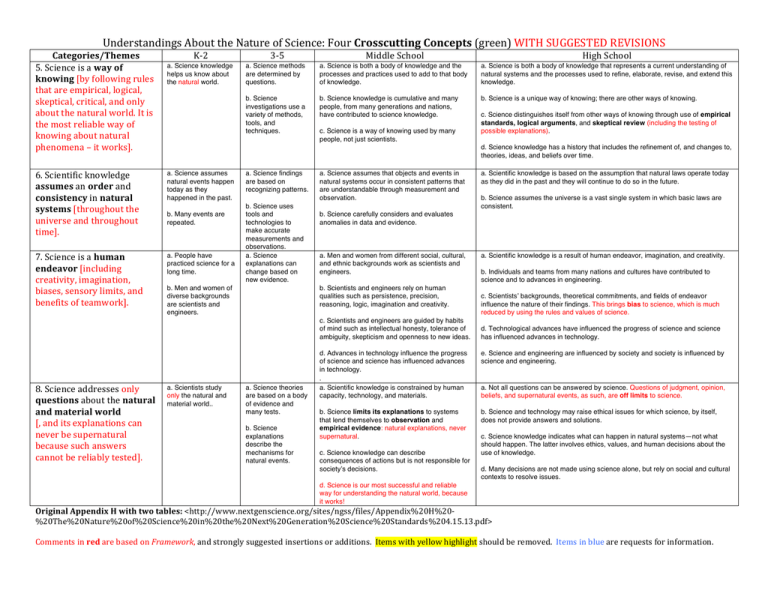
Understandings About the Nature of Science: Four Crosscutting Concepts (green) WITH SUGGESTED REVISIONS Categories/Themes 5. Science is a way of knowing [by following rules that are empirical, logical, skeptical, critical, and only about the natural world. It is the most reliable way of knowing about natural phenomena – it works]. K-­‐2 a. Science knowledge helps us know about the natural world. 3-­‐5 Middle School High School a. Science methods are determined by questions. a. Science is both a body of knowledge and the processes and practices used to add to that body of knowledge. a. Science is both a body of knowledge that represents a current understanding of natural systems and the processes used to refine, elaborate, revise, and extend this knowledge. b. Science investigations use a variety of methods, tools, and techniques. b. Science knowledge is cumulative and many people, from many generations and nations, have contributed to science knowledge. b. Science is a unique way of knowing; there are other ways of knowing. c. Science is a way of knowing used by many people, not just scientists. c. Science distinguishes itself from other ways of knowing through use of empirical standards, logical arguments, and skeptical review (including the testing of possible explanations). d. Science knowledge has a history that includes the refinement of, and changes to, theories, ideas, and beliefs over time. 6. Scientific knowledge assumes an order and consistency in natural systems [throughout the universe and throughout time]. a. Science assumes natural events happen today as they happened in the past. 7. Science is a human endeavor [including creativity, imagination, biases, sensory limits, and benefits of teamwork]. a. People have practiced science for a long time. b. Many events are repeated. a. Science findings are based on recognizing patterns. b. Science uses tools and technologies to make accurate measurements and observations. a. Science explanations can change based on new evidence. b. Men and women of diverse backgrounds are scientists and engineers. a. Science assumes that objects and events in natural systems occur in consistent patterns that are understandable through measurement and observation. a. Scientific knowledge is based on the assumption that natural laws operate today as they did in the past and they will continue to do so in the future. b. Science assumes the universe is a vast single system in which basic laws are consistent. b. Science carefully considers and evaluates anomalies in data and evidence. a. Men and women from different social, cultural, and ethnic backgrounds work as scientists and engineers. b. Scientists and engineers rely on human qualities such as persistence, precision, reasoning, logic, imagination and creativity. c. Scientists and engineers are guided by habits of mind such as intellectual honesty, tolerance of ambiguity, skepticism and openness to new ideas. d. Advances in technology influence the progress of science and science has influenced advances in technology. a. Scientific knowledge is a result of human endeavor, imagination, and creativity. b. Individuals and teams from many nations and cultures have contributed to science and to advances in engineering. c. Scientists’ backgrounds, theoretical commitments, and fields of endeavor influence the nature of their findings. This brings bias to science, which is much reduced by using the rules and values of science. d. Technological advances have influenced the progress of science and science has influenced advances in technology. e. Science and engineering are influenced by society and society is influenced by science and engineering. . 8. Science addresses only questions about the natural and material world [, and its explanations can never be supernatural because such answers cannot be reliably tested]. a. Scientists study only the natural and material world.. a. Science theories are based on a body of evidence and many tests. b. Science explanations describe the mechanisms for natural events. a. Scientific knowledge is constrained by human capacity, technology, and materials. a. Not all questions can be answered by science. Questions of judgment, opinion, beliefs, and supernatural events, as such, are off limits to science. b. Science limits its explanations to systems that lend themselves to observation and empirical evidence: natural explanations, never supernatural. b. Science and technology may raise ethical issues for which science, by itself, does not provide answers and solutions. c. Science knowledge can describe consequences of actions but is not responsible for society’s decisions. c. Science knowledge indicates what can happen in natural systems—not what should happen. The latter involves ethics, values, and human decisions about the use of knowledge. d. Many decisions are not made using science alone, but rely on social and cultural contexts to resolve issues. d. Science is our most successful and reliable way for understanding the natural world, because it works! Original Appendix H with two tables: <http://www.nextgenscience.org/sites/ngss/files/Appendix%20H%20-­‐ %20The%20Nature%20of%20Science%20in%20the%20Next%20Generation%20Science%20Standards%204.15.13.pdf> Comments in red are based on Framework, and strongly suggested insertions or additions. Items with yellow highlight should be removed. Items in blue are requests for information.
